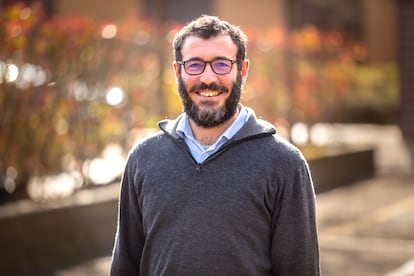Director of Copernicus Climate Change Service: ‘It’s likely that 2024 was the hottest of the last 100,000 years’
Italian climatologist Carlo Buontempo regrets that society has not been able to take advantage of the abundant scientific information available on the planet’s climate imbalance


The average annual temperature of the planet is a mathematical calculation made with measurements taken around the world over the course of a year. As Carlo Buontempo (Rome, 52 years old), director of the Copernicus Climate Change Service — the European Union’s Earth observation program — points out, the main bodies that monitor the world’s climate use different data and methodologies. However, this week these groups presented their 2024 assessment in near-synchronicity, and the results are “very, very similar.” “These are not opinions, they’re facts,” says the Italian climatologist, who is concerned that society is not taking advantage of the enormous quantity of scientific information now available on the planet’s climate imbalance.
Question. Every year of the last decade (from 2015 to 2024) has been among the 10 warmest years on record on Earth. Is climate change intensifying?
Answer. We can’t say based on the data we have, because in the climate system, when it comes to atmospheric observations, there can be a lot of variability. It is still too early to say that what we are experiencing is an acceleration of warming. But it is true that the last 10 years have been the warmest on record.
Q. Why do Copernicus climatologists say that 2024 was the warmest year on record, since 1850, if this warming is unprecedented in thousands of years?
A. It’s likely that 2024 was the warmest year of the last 100,000 years. We say [that it is the warmest year] on record to emphasize that since the mid-19th century, we have had enough meteorological data in various places around the world to be able to reconstruct the climate average over 50 years fairly reliably. Prior to 1850, records were sparser. The earliest records are from the United Kingdom, measuring the average temperature of central England, and those start in the mid-17th century. We do not have direct observations from earlier than that. We instead have to use tree rings, lake deposits, Antarctic air bubbles, which are more indirect measures of the climate situation and have higher uncertainty. Even so, during that period, the climate was quite a bit colder, so it is very likely. The IPCC [the United Nations’ main scientific panel for the study of climate change] says that these current global temperature thresholds have never been reached during the last 100,000 years.
Q. This year NASA, the World Meteorological Organization, the U.S. National Oceanic and Atmospheric Administration, and the London Met Office presented their results on the same day as Copernicus. Were there any differences between them?
A. I think that was a sign of strength, security, of the results. Each of these global centers works with different data, with different methodologies, with different personnel, but their results are very, very similar. All conclude that 2024 was the warmest year and that the last 10 years were the warmest. And in most cases, they found that 2024 was the first year to reach 1.5 degrees Celsius above pre-industrial levels. In the cases in which that wasn’t the result, it was only by a difference of 0.1 degrees.
Q. The Paris Agreement seeks to curb warming so that by the end of the century, the average global temperature rise will stay well below 2 degrees Celsius, limiting it to 1.5. What does it really mean that 2024 is the first year that that 1.5 threshold was reached?
A. I think that 1.5 is a psychological value, since we have been talking about the Paris Agreement limit for years. But it should be stressed that we have not yet passed this threshold, as the Paris Agreement refers to a long-term average, at least 20 years.
Q. Does having to wait 20 years to be able to say that this objective has been missed take a lot of strength away from it?
A. Yes. In 2023, Richard A. Betts and other meteorologists from the London Met Office [the United Kingdom’s meteorological agency] published an article in Nature in which they posit that perhaps another, more useful definition of this target should be sought. A 20-year average is used because if there is a sudden volcanic eruption, the global average temperature would temporarily drop for a year or two. [With another definition], global warming can be validated in a clear way, without interferences like volcanic eruptions or solar fluctuations. Now, if a giant eruption does not occur, the 1.5-degree threshold under the terms of the Paris Agreement will most likely be reached in less than 10 years.
Q. What worries you most about the climate crisis?
A. That we are not capable of taking advantage of the enormous quantity of climate data and information that we have about what is happening. I think that as a society, so far, we do not know how to use it.
Q. Should we be more concerned in Spain about the risk of an increase in extreme events such as October’s catastrophic DANA [a weather phenomenon that caused flash flooding in Valencia]?
A. One piece of cumulative data from 2024 is that last year, the atmosphere’s humidity increased a lot, a direct consequence of the rise in temperature. And as humidity increases, the energy available for extreme events such as the one in Valencia, but also those that have occurred recently in Italy, Slovenia, the Czech Republic, Greece — there is a very clear signal that rainfall has intensified.
Q. Recently, we’ve seen an increase in verbal attacks and assaults on social media directed towards climate scientists who warn about the consequences of global warming. Are you seeing this as well at Copernicus?
A. Yes, a little. To me, this seems like a missed opportunity. It’s bothersome when they insult you, but the biggest problem is that they’re not taking advantage of the observations we have made, which are not opinions, they’re facts. It’s a huge shame.
Q. Today, the forecast is that we will not only exceed 1.5 degrees, but also the 2-degree limit. What awaits us?
A. Every tenth of a degree past 1.5 degrees will cause impacts to be more intense and make things more complicated.
Q. You have two adolescent offspring. Do you talk about this with them?
A. All the time, yes. They know exactly what’s going on, they’re very aware. The world our children will live in will be very different from the one we grew up in, just as the climate today is very different from the one our parents or previous generations saw.
Q. Do you really think the future is in our hands?
A. I think so. But I can’t say what it is that has to be done. If our goal is to limit the rise in temperature, the most efficient way to achieve that right now is by limiting greenhouse gas emissions. That is clear, but it is society’s decision.
Q. Are you concerned about Trump’s arrival in the White House and the rise of other climate change denialist leaders?
A. The information we have as to what is happening with the climate has economic value. I think that we have to make sure that economic value is harnessed.
Q. What is the climate forecast for 2025?
A. We don’t know for sure, but what is expected is that it will be a nearly neutral year in the Pacific, with a very weak Niña [climate phenomenon], and that it will not be as warm as 2023 or 2024. But beyond whether 2025 becomes the warmest year or not, what counts is the overall trend and probably, the average of the next few years will be warmer.
Sign up for our weekly newsletter to get more English-language news coverage from EL PAÍS USA Edition
Tu suscripción se está usando en otro dispositivo
¿Quieres añadir otro usuario a tu suscripción?
Si continúas leyendo en este dispositivo, no se podrá leer en el otro.
FlechaTu suscripción se está usando en otro dispositivo y solo puedes acceder a EL PAÍS desde un dispositivo a la vez.
Si quieres compartir tu cuenta, cambia tu suscripción a la modalidad Premium, así podrás añadir otro usuario. Cada uno accederá con su propia cuenta de email, lo que os permitirá personalizar vuestra experiencia en EL PAÍS.
¿Tienes una suscripción de empresa? Accede aquí para contratar más cuentas.
En el caso de no saber quién está usando tu cuenta, te recomendamos cambiar tu contraseña aquí.
Si decides continuar compartiendo tu cuenta, este mensaje se mostrará en tu dispositivo y en el de la otra persona que está usando tu cuenta de forma indefinida, afectando a tu experiencia de lectura. Puedes consultar aquí los términos y condiciones de la suscripción digital.








































